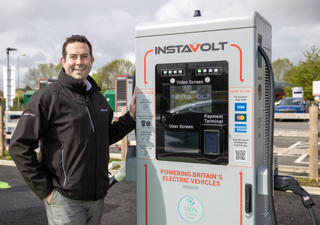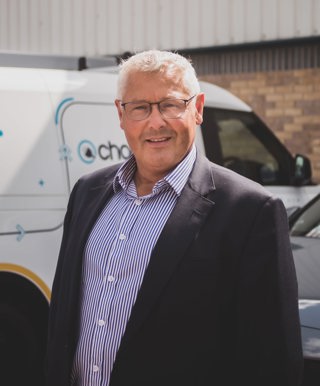Hired to bring a new approach, Ian Carlisle set about consolidating teams and improving throughput.

Viewed by an outsider, Paragon is a confusing company: as a provider of new, in-life and used vehicle services plus, more recently, remarketing, it has touchpoints across the fleet sector and with all types of customer.
Some of the confusion even extended inwards, according to chief executive Ian Carlisle, who celebrates one year in the job this month. As he puts it: “We had lots of pieces, but no clear picture.”
It was, he adds, “what excited me” about the role.
Carlisle has held board positions on a number of FTSE companies in a variety of sectors. Gluing commonalities together, he says, was his focus on customer service: “All that changed was the product.
“Paragon wanted someone to think differently about the business and that’s what I do. I go in to change processes, products, the business or the market.”
In automotive, he enters a sector in the throes of fundamental change, evidenced by the way PCPs are revolutionising the way cars are funded. In fleet, influences such as the economy, taxation and driver desire are changing the mix of vehicles, while record new car sales are putting pressure on both import centres and a second-hand car market that is not used to absorbing such high numbers.
Carlisle believes that the traditional remarketing channels will not be able to cope with rising volumes without distressing values and increasing days in stock. He has told Paragon’s customers that auction should account for no more than 30% of their remarketing volume, with digital and alternative channels offering a way to target vehicles precisely to areas of highest demand (see panel, page 33).
“We asked the question: what is the market looking for?” Carlisle says. “The answer was capacity and throughput: the efficient movement from the port to the dealership to the fleet and, when it comes back, they want it processed efficiently and back into the dealership to sell.”
He adds: “We can process vehicles from end-to-end,” by which he means from the import gate to the second-life remarketing. However, efficiency was compromised because Paragon’s facilities operated in silos.
Consequently, Carlisle’s first decision was to bring together the four Paragon divisions under one team, no mean feat when the organisation processes around one million vehicles a year and operates 13 sites, three parts centres, three defleet facilities, one in-life centre and has a presence at two manufacturer’s import gates. At any one time, it is handling around 70,000 new cars and 50,000 used cars.
“We have reshaped our business around customer need to allow us to shorten or completely remove links through the supply chain,” Carlisle says. “Our new approach creates a greener supply chain that delivers cost-efficiency.”
The approach also puts greater emphasis on looking for longer-term solutions, countering the often short-sighted nature of an automotive sector fixated with three-year deals and tenders. As an example, Carlisle points to the 10-year contract signed with Kia last year that has enabled it to invest in a new 88-acre port operation in Stallingborough, near Grimsby, with capacity to handle 120,000 cars a year.
Port capacity is one of his major concerns. If the new car market rises to around 3m a year, fuelled by PCPs, it would see 400,000 additional cars entering the country. Exacerbating this is a forecast rise in UK production from 1.6m to 2m cars, many of which would be destined for export.
“It could see an extra 800,000 movement of new cars via the ports – what does this mean for capacity?” Carlisle asks.
“We also haven’t seen the real impact of the new car market yet. We are handling product sold in 2012/13 but the market only really kicked off in 2011 so it is early days. The next five years will see 1m cars coming back so the peak of the change has not been seen yet.
“We have to future proof for three or four years’ time and anticipate when these products will hit the market.”
This means assessing whether PCP agreements are going to run the full term, or be swapped out early – potentially as early as 18 months.
Carlisle is anticipating the latter, with more flexibility in timescales to flatten the return of vehicles.
“It will be more of a menu approach,” he says, adding: “Part of my role is to identify how Paragon can support the leasing sector in solving these kinds of problem.
“We want to work on a collaborative basis to establish solutions.”
TECHNOLOGY ‘SHOULD DRIVE INNOVATION’
Paragon is working with manufacturers to offer an outsourced remarketing service which it says will protect residual values and take time out of the used vehicle cycle.
By engaging the retail network and fully leveraging digital channels, speed to market can be improved, eliminating book drops and depreciation, according to Carlisle.
“Technology should be driving the pace of innovation,” he says. “We have seen little innovation over the last decade but we expect this to change as the industry faces some ‘burning platforms’.”
Paragon handles around 50,000 used cars at any one time, but around 60-70% are still sold via physical auctions. Carlisle wants to change this.
“Cars are put on to transporters to go to auction where they get valeted and are either sold or not sold. If they are not sold, they could go on another transporter to another centre,” he says.
“But the retail market is happy to buy online if there is an accurate description and high quality images. They don’t need to attend an auction; it is more expensive and takes longer, which affects values. With online, the only time the car moves is when it is sold.”
He adds: “It is less than half the cost of a physical auction; it can take up to four weeks out of the selling cycle, which eliminates a book drop; and, most importantly, we can get the car in for the purchaser more quickly.”
Paragon has been piloting a system with one manufacturer for its ex-rental and management cars since July last year and is nearing the stage where it can be launched for all types of defleeted vehicle. There is interest from manufacturers and leasing companies, says Carlisle.
A SPECIALIST APPROACH
While the majority of its business is cars, Paragon also has a dedicated operation for vans, handling around 23,000 a year – half new, half used.
Services range from carrying out full livery at the port for larger fleet customers to repainting vehicles.
The company has also invested in a bespoke refurbishment facility for alloys. On average two wheels per car require the service, amounting to 600,000 alloys a year. The market cost of repair would be around £80-100 per wheel, so Paragon is able to save itself and its customers a lot of money.
TECHNOLOGY ‘SHOULD DRIVE INNOVATION’
Paragon is working with manufacturers to offer an outsourced remarketing service which it says will protect residual values and take time out of the used vehicle cycle.
By engaging the retail network and fully leveraging digital channels, speed to market can be improved, eliminating book drops and depreciation, according to Carlisle.
“Technology should be driving the pace of innovation,” he says. “We have seen little innovation over the last decade but we expect this to change as the industry faces some ‘burning platforms’.”
Paragon handles around 50,000 used cars at any one time, but around 60-70% are still sold via physical auctions. Carlisle wants to change this.
“Cars are put on to transporters to go to auction where they get valeted and are either sold or not sold. If they are not sold, they could go on another transporter to another centre,” he says.
“But the retail market is happy to buy online if there is an accurate description and high quality images. They don’t need to attend an auction; it is more expensive and takes longer, which affects values. With online, the only time the car moves is when it is sold.”
He adds: “It is less than half the cost of a physical auction; it can take up to four weeks out of the selling cycle, which eliminates a book drop; and, most importantly, we can get the car in for the purchaser more quickly.”
Paragon has been piloting a system with one manufacturer for its ex-rental and management cars since July last year and is nearing the stage where it can be launched for all types of defleeted vehicle. There is interest from manufacturers and leasing companies, says Carlisle.
Factfile
Company: Paragon
Chief executive: Ian Carlisle
Time in role: One year
Core business: New vehicles, in-life services, used vehicles and remarketing
Vehicles handled per year: One million
Customers: Manufacturers, leasing, rental, large fleets

















Login to comment
Comments
No comments have been made yet.